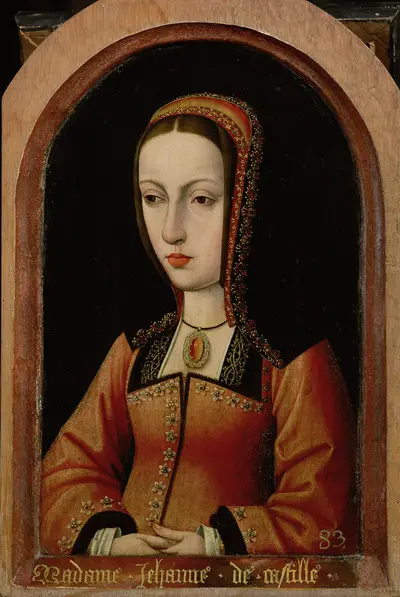
For Juana, in pitting herself against her husband, and other men, became a target for the powerful men who wanted her throne. Her visit to her dying grandmother, who had been imprisoned for her madness, foreshadows the last years of her own life. Gortner allows Juana to tell her story, looking back at her life. Once she was named heir to her mother's throne, she would find herself pitted against the husband she once loved. As tragedy after tragedy befell her family, this young woman found herself on the path of destiny.

However, when her husband became greedy for power, and sought to unite his duchy with France, she refused to be a party to a union with Spain's enemy. There, she was a contented wife and mother. Her mother, who was actually the more powerful of her parents, sent her to Flanders to marry Philip, heir to the Hapsburg empire. When she was thirteen, her parents conquered Granada, seizing it from the Moors, and uniting Spain. Juana of Castile, daughter of Isabella and Fernando was an Infanta of Spain. Gortner's story shows a woman with method behind her madness, a tragic, yet triumphant queen who never ruled Spain. It's well-done, sets the scene, and begins with the comment that history says she went made with love, but history can be wrong. It doesn't hurt to listen to his commentary before reading the book. As he says in the outstanding commentary on his website, Juana of Castile, the last queen of Spain, is almost unknown outside of Spain. Gortner could have called his historical novel, The Last Queen, the lost queen or the forgotten queen. Catherine's sister was Juana of Castile, known in Spain as Juana la Loca. If you're an Anglophile, or enjoy biographies of queens, you undoubtedly know the story of Catherine of Aragon, Henry VIII's first wife. Gortner sets his story firmly in its historical context, giving the reader a clear sense of a time when adultery was a given and wives were expected to turn their heads, political ambition was paramount, and strong independent women risked being branded as crazy (in Spanish, loca.) The plot pacing is perfec Historical figures come alive, and relationships and alliances between various 15th century European monarchs are illuminated. The diverse cast of characters in this novel - both heroes and villains - is well developed, sure to evoke a mixture of compassion, admiration, and ire in the reader. She was driven by an underlying loyalty to Spain that compelled her to accept unthinkable risk in order to claim her rightful place as its queen. She missed her children, all of whom she was separated from at various points in time. Juana was anguished by the mistrust she felt toward her husband and parents. The Spanish nobles who had long resented the power held by Ferdinand and Isabella were determined to wrest it from Juana as soon as the opportunity presented itself. Church officials were corrupt, and often the most politically ambitious men around. Her parents put political objectives before family. Her husband was influenced by deceitful, unscrupulous advisors.

The life Juana had built in Flanders crumbled as everyone around her scrambled to exploit any and every possible political advantage.

But everything changed when, through a succession of family deaths, Juana became direct heir to the Spanish throne she suddenly saw an ambitious, calculating, even cruel side of her dashing husband.

Initially resistant to the marriage, Juana eventually fell in love with Philip and resigned herself to life in Flanders, outside her beloved Spain. Her parents arranged a marriage between Juana and Philip the Fair, Hapsburg heir and archduke of Flanders. In 15th century Europe, royal children were betrothed in marriage not for love, but to facilitate political alliances. Ferdinand and Isabella passed their passion and fierce nationalism on to at least one of their four daughters: from childhood, Juana harbored an intense loyalty to her native land. Juana has never known life apart from the crusades and her parents' all-consuming dedication to uniting Spain and expelling the Moors. Her parents, Ferdinand and Isabella, have just conquered Grananda, ending 300 years of Moorish rule. The novel opens in 1492 when Juana is 13 years old. Gortner proves that Juana's story is just as complex and captivating as that of her more famous younger sister. But few people know about Juana of Spain, also known as Juana la Loca, sister to Henry VIII's first wife Katherine of Aragon.
#Juanna la locad childhood series#
The Tudors of England have enjoyed surging popularity in the past year, with a hit Showtime series and Philippa Gregory's acclaimed historical novel The Other Boleyn Girl, which was adapted to the big screen last winter.


 0 kommentar(er)
0 kommentar(er)
